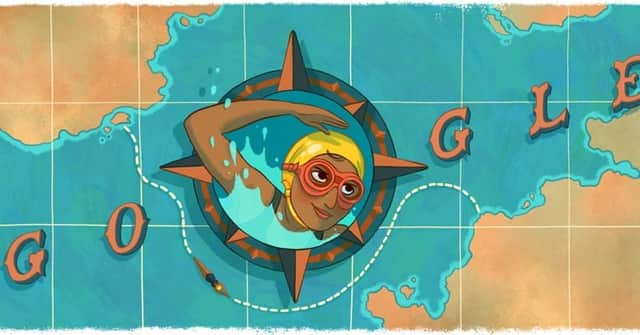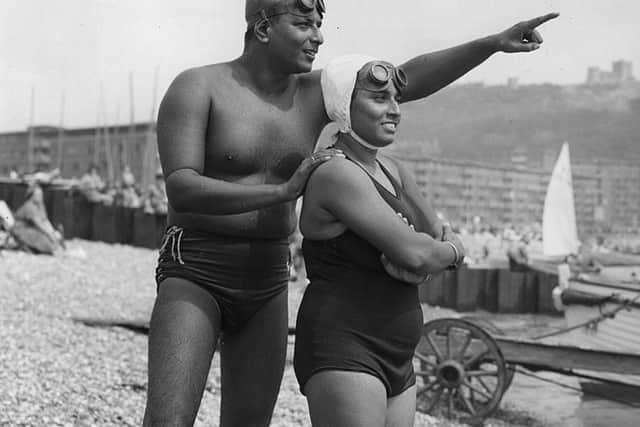Arati Saha is the subject of today’s Google Doodle - here’s why


Today’s Google Doodle (Thursday 24 September 2020) celebrates Arati Saha, a trailblazing Indian swimmer.
The date today is significant because it would have been Saha’s 80th birthday.
Advertisement
Hide AdAdvertisement
Hide AdThis is everything you need to know about the life of Arati Saha.
Who is Arati Saha?
Arati Saha was born in Kolkata (then known as Calcutta) on 24 September 1940.
Saha was the second of three children and the first of two daughters to her parents. Her father was an employee in the armed forces, and at age two and a half, Saha lost her mother.
Her older brother and younger sister were raised by their maternal aunt and uncle, whereas Saha herself was raised by her grandmother in North Kolkata.
Advertisement
Hide AdAdvertisement
Hide AdAt the age of four, she would go with her uncle to the Champatala Ghat, which is where she learned how to swim. Having noticed her interest in swimming, Saha’s father admitted her to the Hatkhola Swimming Club.
Her ability in the water was soon noticed by one of India’s top competitive swimmers, Sachin Nag, who took Saha under his wing. At the age of five, Saha won her first swimming award - gold in the 110 yard freestyle at the Shailendra Memorial Swimming Competition.
What is she famous for?
Saha would become a trailblazing swimmer. At the age of 11, she was already known as a swimming prodigy.
Throughout her career, Saha earned a multitude of honours, including setting an all-India record in 1949 and breaking Dolly Nazir’s all-India record at the 1951 West Bengal state meet.
Advertisement
Hide AdAdvertisement
Hide AdSaha was also the youngest member, and one of only four women, on the first team to represent a newly independent India in the 1952 Summer Olympics in Helsinki, Finland.
Her biggest achievement took place on 29 September 1959, where she swam an incredible 42 miles, from Cape Gris Nez, France, to Sandgate in England, becoming the very first Asian woman to swim across the English Channel. The challenge took her 16 hours and 20 minutes. The Google announcement about today’s Doodle states that this feat is considered “the swimming equivalent of climbing Mount Everest.”


Saha used to take part in long distance swimming competitions in the Ganges, and first got the idea to cross the English Channel from Bangladeshi swimmer Brojen Das.
In honour of her achievements, Saha became the first ever female recipient of India’s Padma Shri award in 1960. The Padma Shri award is awarded to Indian citizens in recognition of their distinguished contribution in various categories, like art, education, science and sport.
Advertisement
Hide AdAdvertisement
Hide AdIn 1999, the Department of Posts created a postage stamp in her honour.
Was she married and did she have children?
In 1959, Saha married her longtime manager, Dr Arun Gupta. They first had a court marriage before later having a social marriage. Her in-laws’ house was near to her grandmother's house.
After her marriage, Saha had a daughter called Archana.
When did she die?
On 4 August 1994, Saha was admitted to a private nursing home in Kolkata with acute jaundice and encephalitis, just before she turned 54.
After battling for 19 days, Saha passed away on 23 August.
Who created today’s Google Doodle?
The Google Doodle was illustrated by guest artist Lavanya Naidu, a fellow Kolkata native.
Advertisement
Hide AdAdvertisement
Hide AdIn a Q&A with Google, Naidu said, “Having been born and raised in the city of Kolkata, for me, Arati Saha was a known household name growing up.
“My brother and I used to be avid stamp collectors as kids and I remember our excitement when her stamp was issued in the 90s! Having the opportunity to now celebrate her achievements with this Doodle is truly an honour!”
Naidu explained that she drew her inspiration for the design from Saha’s most celebrated achievement - crossing the English channel, and becoming the first Asian woman to do so.
“I definitely wanted to portray that milestone in the Doodle and tried a few variations before narrowing down to the map concept, which I felt best captures it,” she said.
Advertisement
Hide AdAdvertisement
Hide AdNaidu added, “I hope it adds to the celebration of female figures in our country’s history and of human resilience.
“I also hope it’s an inspiration to people everywhere to dream big no matter where you come from.”
A version of this article originally appeared on our sister title The Scotsman